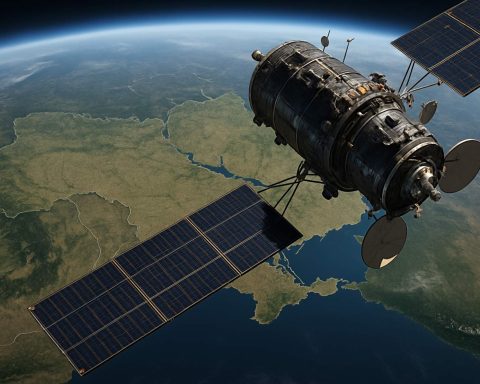- Bill Ackman criticizes Donald Trump’s tariff strategy, highlighting its detrimental impact on international trust and trade relations.
- Tariffs are described as a “blunt instrument” that disrupt global economic confidence and partnerships.
- Ackman stresses the importance of trust as a vital currency in the business world, warning against its erosion due to indiscriminate tariffs.
- The introduction of sweeping import taxes affecting 60 nations raises concerns about investor confidence and potential economic isolation for the U.S.
- Ackman cautions that the loss of trust could lead to a recession, shaking both Wall Street and America’s status as a reliable trading partner.
- The article emphasizes the need for a measured approach to global trade, rather than relying on aggressive tariff policies.
Bill Ackman, a voice resonating through the financial corridors, criticizes President Donald Trump with a fervor that echoes far and wide. Known for his sharp investment acumen, Ackman steps out of the shadows with a bold critique of Trump’s tariff strategy, passionately arguing that the heart of America’s trade ethos is teetering on the brink.
Ackman’s message is vivid: tariffs are a blunt instrument that splinter trust, fragmenting the delicate balance of international business relationships. This isn’t merely a financial disagreement but a deep concern for the invisible threads of economic confidence that bind nations together. He paints a stark picture—imagine the fabric of international trust, once seamless, now frayed by the jagged edges of these swift tariff hikes.
He challenges the commander-in-chief’s economic calculus, suggesting the President’s over-reliance on advisors has misled the nation into a precarious position. The vast, intricate web of global trade, Ackman emphasizes, demands more than blunt force; it requires a careful, measured approach.
Ackman’s alarm bell rings loudest over the prospect of America losing its status as a reliable partner. Trust, he argues, is the currency of the business world, and once eroded, it is nearly impossible to rebuild. With the introduction of sweeping import taxes affecting 60 nations, including allies and rivals alike, Ackman foresees the erosion of trust that underpins investor confidence and global partnerships.
The stakes seem clear: a potential recession looms as Wall Street trembles amid growing fears. While unfair trade practices exist, Ackman warns against the indiscriminate use of tariffs that can isolate America from the global economy, isolating businesses and shaking investor faith.
For Ackman, it’s not just about numbers and markets—it’s about the very identity of America as a beacon of trust and opportunity. This is the backdrop against which he declares with heartfelt conviction: This is not what we voted for.
In this delicate dance of global economics, the takeaway is stark and simple—when trust falters, so too does the promise of prosperity. Ackman’s urgent plea underscores a critical lesson: to tread lightly with the power that comes from economic leadership, lest it slip through the nation’s fingers.
How Tariffs Could Shape the Future: Bill Ackman’s Warnings and What They Mean for Investors
Introduction
Investor Bill Ackman’s critique of Donald Trump’s tariff strategy brings to light significant concerns over the impact of tariffs on the global economic landscape. While the initial conversation centers around presidential policies, there are deeper implications for international trust, investor confidence, and America’s economic identity.
Understanding Tariffs and Their Impact
1. Economic Disruptions:
– Consumer Prices: Tariffs can ultimately increase the cost of imported goods, which escalates consumer prices. This impacts purchasing power and can slow economic growth.
– Domestic Industries: While intended to protect domestic industries, tariffs often lead to retaliation, affecting export markets for American companies.
– Supply Chain Disruptions: Increased tariffs force companies to re-evaluate international supply chains, potentially leading to inefficiencies.
2. Global Trust and Relations:
– Investor Confidence: Bill Ackman emphasizes that trust is critical. Without it, investor confidence wanes, leading to decreased foreign investments and a volatile stock market.
– Partnership Strain: The imposition of tariffs on allies can strain international relationships, potentially isolating America on the global stage.
Real-World Use Cases
– Manufacturing: Companies like automobile manufacturers that rely on imported parts may face increased costs, ultimately affecting the final price of vehicles.
– Agriculture: Farmers dependent on export markets may suffer from retaliatory tariffs, leading to surplus and potential loss of revenue.
Industry Trends and Predictions
– Shift to Local Sourcing: If tariffs persist, industries may shift towards local sourcing to mitigate costs, potentially revitalizing some domestic industries but at a higher cost.
– Economic Nationalism: A move towards self-reliance and economic nationalism might follow, impacting globalization trends.
Pros and Cons Overview
Pros:
– Potential protection for domestic industries in the short term.
– Can be used as a bargaining tool in trade negotiations.
Cons:
– Risk of trade wars and retaliatory measures.
– Increased costs for consumers and businesses.
– Erosion of international trust and partnerships.
Expert Insights
Economists widely acknowledge that while unfair trade practices do exist, the blanket application of tariffs is not the solution. It is suggested that tariffs should be targeted and strategic rather than indiscriminate to avoid economic fallout.
Actionable Recommendations
– Investors: Diversify portfolios to mitigate risks associated with global trade uncertainties.
– Businesses: Consider reassessing supply chains and exploring local sourcing to reduce exposure to tariff impacts.
– Policy Makers: Engage in multilateral trade discussions to develop more targeted, strategic economic policies.
Conclusion
Bill Ackman’s warnings serve as a critical reminder of the delicate balance required in global economic leadership. Moving forward, policymakers and business leaders must work collaboratively to ensure that trust and prosperity remain at the forefront, preserving America’s role as a reliable trade partner.
For more insights on global trade trends, visit Harvard University and Global News.
This in-depth exploration reveals the broader implications of tariffs and equips readers to make informed decisions in the face of potential economic shifts.











